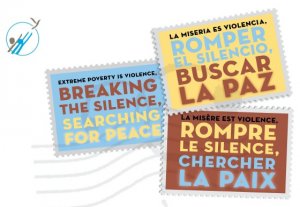Speech by Professor Paul Dumouchel, Graduate School of Core Ethics and Frontier Sciences at Ritsumeikan University, Japan.

Opening plenary Colloquium 2012:” Extreme poverty is Violence. Breaking the Silence. Searching for Peace” at UNESCO House 26th January 2012
Extreme poverty is violence
What is violence? The answer to that question is both extremely easy and remarkably difficult. It is extremely easy to answer, because anyone can recognize violence when he or she “sees it” so to speak, especially when one is at the receiving end. It is a question that is remarkably hard to answer, because nobody really knows how to say what violence is in a way that will convince everyone, especially in a way that will convince the unsympathetic listener. That what one is taking about actually, really is violence, for example that extreme poverty is violence, is often easy to see, but it is hard to demonstrate. Why is that? Even if in some cases it proves relatively easy to affirm that something, that some action or situation is a form of violence, in other cases it turns out to be highly difficult, nearly impossible. That is why it is remarkably difficult to say what violence is because it is only in some cases that we can say, clearly and with other agreeing that this event or circumstance is violence. While in other cases, there is little agreement and even those who seem to us to be the victims of that violence hesitate, avoid, refuse, or more simply, themselves will not say “this is violence.” Why?
It seems to me that the difficulty of saying what violence is, is part of the violence itself, part of what it is. In this case the difficulty of saying, in the sense of making evident to all, that extreme poverty is violence is part of the violence of extreme poverty. Only part of course, but a part that is unlikely to go away until extreme poverty itself disappears. Alternatively successfully getting across the message that extreme poverty is violence is an important step in the direction of overcoming extreme poverty. But how do we do that? And why is it so difficult to say?
It is characteristic of most violence that is immediately recognized as such by most people, for example rape, murder, willfully physically wounding or hurting someone that it tends to provoke a violent response. This, I believe, is not directly related to the type of violence that it is, for example physical violence as opposed to economic oppression. Massive economic inequality is not always perceived as unfair or violent and physical abuse itself when it does not evoke a violent response is often not perceived as violence by third parties (those who are not its immediate victims), and sometimes also by the target of the action themselves. Instead we, and often they, tend to see it as a punishment, as something they deserved, or as just “the way things are”. We tend to recognize as violent actions that evoke a violent reaction in response (of course this raises the question: how do we recognize that response as violent?), while we tend to overlook, dismiss as unimportant or remain indifferent to actions of the same type which do not call forth such a violent reaction. Why?
The fact is that when people suffer violence which they do not recognize as such we, the external observers, tend to believe that the violence exerted against them is larger, more extreme that what we can directly perceive because it has made them, and often makes us, unable to recognize it as violence. Something similar applies, I think, to extreme poverty. The difficulty of saying that it is violence suggests that it is in many ways extreme violence, because the consequence of extreme violence in the most usual sense of the term is always to silence definitively those who are its victims.

